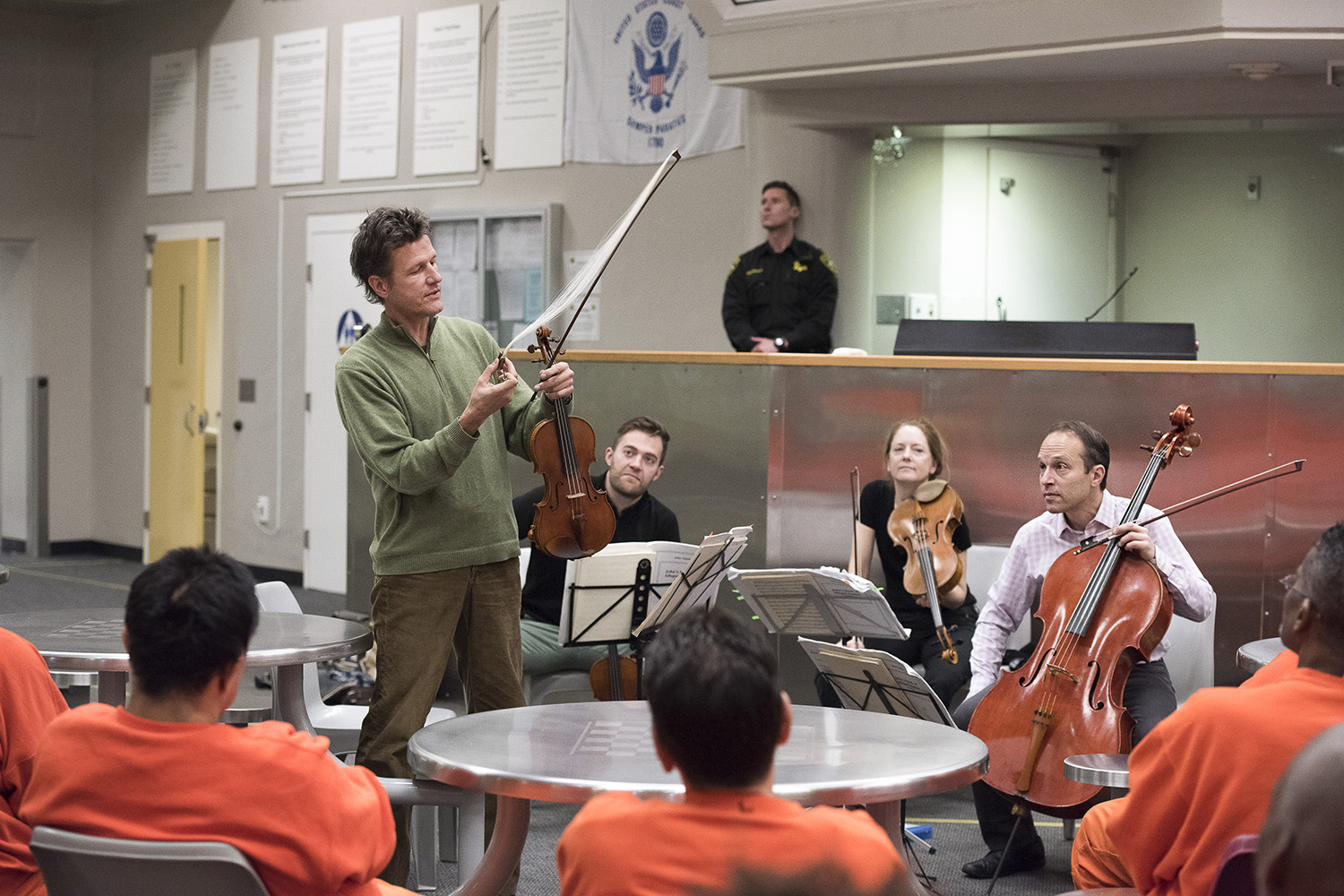Stanford’s St. Lawrence String Quartet celebrates 30 years of bringing people together through music
The St. Lawrence String Quartet, Stanford University’s ensemble-in-residence, has brought their insight and musical passion to classrooms across campus, in free online courses and into the local community.

Violinist Geoff Nuttall demonstrates the horsehair ribbon of his bow during a performance by the St. Lawrence String Quartet at the San Francisco County jail. (Image credit: L.A. Cicero)
The St. Lawrence String Quartet (SLSQ), Stanford’s ensemble-in-residence, is fiercely committed to building communities through music and education. Whether they’re playing in a nontraditional venue or teaching students and musicians in person or online, the SLSQ strives to make connections with people who might not otherwise have access to chamber music.
Established 30 years ago in Toronto in 1989 and joining the Stanford faculty in 1998, the SLSQ has drawn praise since its inception for the intensity of its performances, its breadth of repertoire and its commitment to community building through music and education.
Their commitment to community-building has been a hallmark of their tenure at Stanford.
Bringing music to unexpected spaces
Shortly after arriving at Stanford, the SLSQ founded the Summer Chamber Music Seminar in 1999 to host professional and amateur musicians from across the country for intensive instruction. A signature feature of the seminar is a series of free concerts and talks participants provide for the local community. Past years have seen ensembles perform for patients at the Lucile Packard Children’s Hospital and for residents of local retirement communities. A mainstay is the Azure Family Concert, which welcomes families of children on the autism spectrum. Audience members are encouraged to sing, dance and interact with the music, all in a welcoming “hush-free” and safe environment.

The Azure Family Concert welcomes children on the autism spectrum to interact with the music. (Image credit: Courtesy SLSQ)
“Playing for the Azure concert this year was a true highlight. Getting to engage with the children, families and caretakers was incredibly joyful and gave me an entirely new perspective on my role as a musician,” said Ed Wu, cellist and participant in the 2019 seminar.
In 2019 alone, more than 2,500 audience members enjoyed these events, and since its inception, the seminar has reached over 20,000 people in the community.
John Batchelder, a 2019 seminar participant and member of the Lott String Quartet in residence at the University of New Orleans, said, “This program embodies the generous, communal, collaborative and creative spirit that makes our career as musicians so fulfilling.”
Mentoring the next generation of musician
The SLSQ – whose ongoing exploration of nontraditional venues and new audiences was shaped, in part, by their community outreach – observed a need for similar training programs for the next generation of emerging artists. In response to this need, the SLSQ developed the Emerging String Quartet Program (ESQP).
ESQP was launched in 1999 to provide mentorship to promising young chamber musicians. The residency program has invited quartets from all over North America and offers training in musicianship and community building. On the music side, the SLSQ coaches the musicians to play with greater feeling and more unity, helping them achieve their full potential. When it comes to community building, the young musicians spend afternoons planning and performing concerts in nontraditional venues for audiences who may otherwise never experience a live string quartet.
Ensembles have played at the Boys and Girls Club of East Palo Alto, the California School of the Blind, the Children’s Library of Palo Alto, the LGBTQ Youth Space in San Jose and numerous local public schools. The residency program is meant to give young ensembles the opportunity to hone their skills performing for and engaging with a vast array of audiences, with constant guidance and feedback provided by the SLSQ.
“Interacting with the students of a local elementary school was an eye-opening experience for us,” says ESQP alumnus Jeffrey Myers, violinist with the Calidore Quartet based in New York City. “Seeing the immediate impact that the music of Schubert and Beethoven had on the families we played for helped us understand the uniting power of this music.”
Teaching music to anyone, anywhere
In recent years, the SLSQ teamed up with Stephen Hinton, the Avalon Foundation Professor in the Humanities and professor of music history in the Department of Music, on two online courses published through Stanford Online.
Free and open to the public, these courses are for anyone interested in learning more about classical music written for the string quartet. The first focuses on the 18th-century composer Franz Joseph Haydn, who was the first composer to write great works for string quartet. The second delves into the life and work of Ludwig van Beethoven, a student of Haydn and an avid composer of string quartets himself. Hinton gives short lectures on the composers’ lives and inspiration, and then turns to the SLSQ to play examples of the music discussed.
Thousands of people from around the world have enrolled in the courses, helping to build a global community of music lovers who may not have access to a traditional concert hall or classroom.
Over the course of 30 years, the SLSQ has brought classical music to hundreds of thousands of people. The joy of it, says SLSQ first violinist Geoff Nuttall, is seeing listeners light up when they hear something that moves them. “What’s even better,” he adds, “is when we can pass on the tools and skills we’ve gained over the decades to a young quartet just starting out. Then they can return to their home base to teach and play in schools, hospitals and jails, ultimately reaching more people than we ever could on our own.”
This year, the SLSQ marks its 30th anniversary season with musical engagements celebrating new compositions alongside cornerstones of the chamber music repertoire. For more information about the SLSQ, please visit slsq.com.
